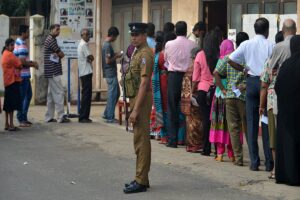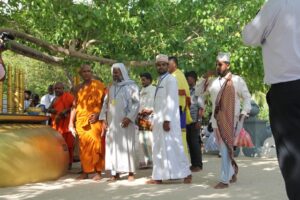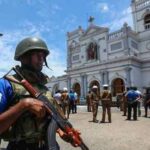
NPP’s Trail and Error Governance and the way to win General Elections
- CNL Reporter
- November 3, 2024
- Weekly Political Review
- General Elections, NPP
- 0 Comments
Weekly Political Review
Wide Angle Zooming into election law breaches, conflicted new appointments.
By Rohana Jith
Sri Lanka’s political and economic landscape is undergoing a significant transformation following a recent presidential election and ongoing efforts to recover from a severe economic crisis. Historically, economic conditions have influenced political outcomes, yet the relationship is never straightforward. Sri Lanka’s 2024 presidential election is a striking example, as it occurred amid signs of economic recovery yet resulted in a dramatic political shift.
As the new President Anura Kumara Dissanayake was elected on a platform of heralding a systemic change, his selection of personnel to discharge the key responsibilities of the administration would be observed with keen interest by the general public.
An inexperienced and understaffed government has been appointing individuals with potential conflicts of interest to senior roles within state institutions.
Human rights organizations have filed formal complaints about recent appointments, which appear to violate current election laws. Some appointees have been accused of having conflicts of interest.

In line with their campaign promises, the government has started a process to remove various “privileges” granted to political officeholders. Both issues highlight the challenge of managing conflicts of interest.
According to election laws and the official Gazette released by the Election Commission on September 25, all government institutions are barred from making new appointments, promotions, or transfers during the election period without prior approval from the Commission.
Anura Kumara Dissanayake, the leader of the left-leaning Janatha Vimukthi Peramuna (JVP), achieved an unexpected victory, gaining 42% of the vote—an impressive leap from the mere 3% he garnered in 2019.
His victory reflects a growing public demand for change, particularly among those disillusioned with traditional political elites who were often accused of corruption and mismanagement.
This electoral shift away from established parties like the Rajapaksa-dominated SLPP. , Ranil Wickremasinghe led United National Party (UNP) and UNP breakaway Samagi Jana Balawegaya (SJB) is emblematic of a broader call for reform, particularly in economic policies, governance, and social welfare.
In light of this political momentum, Dissanayake quickly called for a parliamentary election, set for November 14, which has generated significant political tension.

Established politicians fear an overwhelming victory for the National People’s Power (NPP) party, with some of the country’s most prominent political families, such as the Rajapaksas, already stepping back from the political arena.
Dissanayake’s focus on anti-corruption, transparency, and accountability has resonated with many, particularly younger voters eager to see an end to decades of political stagnation. However, whether the NPP can secure an outright majority remains uncertain, and a coalition government may be necessary.
Potential for a Hung Parliament and the Role of Coalitions
If the NPP fails to obtain the 113 parliamentary seats needed for a majority, Sri Lanka may face a hung parliament, compelling the NPP to form alliances with other parties. One possibility is a coalition with the Tamil National Alliance (TNA), which holds considerable influence in the Northern and Eastern regions.
Such a coalition would likely be challenging but could also encourage compromises on crucial issues like economic reform, social welfare, and ethnic reconciliation.

Opposition parties, like the SJB and UNP, retain a substantial base of support. Sajith Premadasa, SJB’s leader, received considerable backing in the presidential race but may struggle to convert that support into parliamentary influence given the NPP’s rising popularity. Nevertheless, a strong opposition presence could keep the NPP accountable and pressure it toward more moderate governance.
Broader Implications for Reform and Foreign Relations
The new administration is likely to prioritize structural reforms to meet public demand for transparency and effective governance. This includes addressing issues of economic mismanagement, corruption, and strengthening social services. Foreign relations will also be critical as Sri Lanka seeks investments and aid, especially from India, China, and Western countries, to stabilize its economy and manage debt.
Sri Lanka’s shifting political scene has repercussions not only for internal policies but also for the nation’s role in regional geopolitics.
The country’s reliance on foreign loans and the global interest in the Indian Ocean region mean that Dissanayake’s administration will need to carefully balance its relationships with powerful nations, particularly China and India.
While the NPP’s platform includes reducing foreign dependence, achieving true economic autonomy will require significant reforms and a cautious approach to diplomatic relations.
Rising Security Concerns and Politicization of Threats
Amid these political shifts, recent security concerns have emerged following an Israeli travel warning about potential Islamist terrorist attacks in Sri Lanka, particularly in Arugam Bay.
Some political groups, notably those defeated in the presidential election, have seized upon these concerns, drawing attention to a small number of Jewish places of worship in the predominantly Muslim region as a potential security risk.
However, locals have expressed little worry over these places of worship, suggesting that political groups may be amplifying these issues for political gain rather than addressing genuine security threats.
Sri Lanka has a tragic history of ethnic conflict, with a 30-year civil war that ended in 2009 at great human cost. The politicization of alleged security threats against minority communities could potentially stir ethnic divisions, risking a repetition of the conflicts of the past. Political leaders and security advisors are urged to prioritize unity over sensationalist narratives for political gain.
New Administration’s Economic Vision and IMF Conditions
Anura Kumara Dissanayake’s presidency signals a major shift, with a renewed focus on reducing economic inequality and responding to the fallout from Sri Lanka’s recent economic crisis. His administration has inherited the task of stabilizing an economy still reeling from inflation, high debt, and increased living costs. Central to his platform is reducing reliance on foreign loans, specifically from nations like China, by promoting domestic industries and improving social services like healthcare and education.
Dissanayake’s anti-corruption stance also differentiates him from previous leaders, who often faced allegations of public sector corruption. However, concerns remain about his party’s militant history and the potential for authoritarianism. His democratic election, combined with his promises of moderate reforms, suggests a commitment to peaceful governance.
The president faces a tough balancing act between economic reform and adhering to IMF conditions tied to a $2.9 billion loan. Although this IMF support is essential to recovery, it has come with austerity measures that have worsened living conditions for many citizens. To address this, Dissanayake’s administration is attempting to renegotiate some of the IMF terms, focusing on easing tax burdens on essential goods and services to protect lower-income citizens from further hardship.
Sri Lanka’s Economic Recovery and Fiscal Strategy
Since September 2024, Sri Lanka’s economy has shown encouraging signs of recovery, driven by growth in tourism, exports, and strategic reforms. The World Bank has forecasted a 4.4% GDP growth rate, reflecting a rebound in key sectors like tourism and manufacturing. The Central Bank of Sri Lanka (CBSL) has maintained inflation rates within target levels by cautiously injecting liquidity into the economy to support stability.
Debt management remains a top priority for the new administration. By issuing treasury bills and bonds, Sri Lanka has raised significant funds to service its debt obligations and stabilize public finances. These measures, while essential, have raised concerns over potential borrowing excesses. However, economic experts emphasize that treasury bill issuance is routine and aligns with the country’s debt management framework. Notably, the bulk of funds raised were allocated to debt servicing rather than new debt accumulation.
Amid this recovery, the CBSL has clarified its use of Open Market Operations (OMOs) to counter concerns about “money printing,” stressing that its liquidity injections aim to stabilize short-term interest rates and are consistent with international standards.
Debt Restructuring and Collaborations with the IMF
Sri Lanka’s debt restructuring, essential for improving international credit standing, is expected to conclude by the end of 2024. Supported by the IMF, Sri Lanka is negotiating debt terms with key creditors, including the China Development Bank, and anticipates an upgraded credit rating upon resuming repayments. The government has taken steps to maintain constructive relations with credit rating agencies, which could signal a brighter fiscal outlook once restructuring efforts are completed.The IMF’s third review, tied to the next tranche of its loan, was delayed due to the presidential election and budget submission postponements. This delay is likely to extend until early 2025, affecting the timing of IMF disbursements. Nonetheless, Sri Lanka has received approximately $1 billion so far, helping stabilize the economy.
Challenges and Outlook for the Future
Sri Lanka’s economic recovery is progressing, but the road ahead is challenging. High poverty rates, food insecurity, and inflation demand careful policy management. Debt restructuring and reliance on treasury securities are crucial for achieving financial stability, but comprehensive reforms, particularly in labor and trade, are needed to ensure sustained growth. The government must also foster inclusivity in the workforce, aiming to uplift marginalized communities and address poverty.
Ultimately, the success of Dissanayake’s administration will depend on its ability to uphold promises of transparency, equity, and independence while navigating complex economic and political landscapes. His presidency could mark a turning point for Sri Lanka, offering an opportunity to forge a resilient economy and strengthen democratic institutions amidst shifting regional dynamics.

